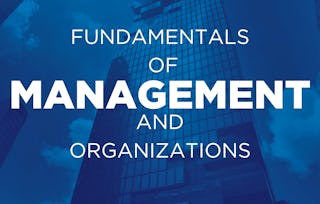This course is designed for students of all backgrounds who have an interest in how firms are governed, the forces that have helped define modern management practice, and the outcomes of that practice not only for the firm itself, but also for the societies in which they operate. For students who are thinking of a career in management, it may also prove useful as a basic introduction to some of the conceptual vocabulary and ideas behind modern theories of management.

Critical Perspectives on Management

Critical Perspectives on Management

Instructor: Rolf Strom-Olsen
14,830 already enrolled
Included with
313 reviews
Skills you'll gain
Details to know

Add to your LinkedIn profile
18 assignments
See how employees at top companies are mastering in-demand skills

There are 6 modules in this course
In Ancient Rome, merchant organisations very similar to modern firms were critical to capitalising key markets and to solving serious logistical problems to enable a vibrant trading network across the Mediterranean, including, critically, supplying the city of Rome itself with the food its citizens needed to survive. We will examine the Roman grain market and the organisations that operated within that market to ask: what, exactly, is a firm? What led to the firm's evolution? And what is the issue of agency that a firm inevitably entails?
What's included
6 videos3 readings5 assignments
This lecture expands upon the first discussion, drawing from the insights gained about firm organisation in the Ancient world to ask about the effectiveness of the Forced Distribution Ranking Scheme (also known as "stack and rank", "up and out", etc...) to evaluate and promote or terminate employees, widely used by many of today's leading corporations.
What's included
4 videos1 reading4 assignments
We live in the innovation economy. Firms have chief innovation officers. Innovation is, so we are told, the key to securing the future. And there are quite literally millions of books on the subject of innovation. So, what does it mean? And is it a useful idea for management? We'll consider both questions.
What's included
5 videos1 reading4 assignments
What do Hollywood movies, the Synoptic gospels, housing bubbles, Alan Greenspan's monetary policy, and the world's worst merger have in common? This week's lecture will develop a reading of narrative in order to explore a common pitfall that affects many managerial decisions.
What's included
9 videos1 reading2 assignments
Perhaps the most important lecture of the course. Almost all publicly traded firms are beholden, either explicitly or implicitly, to the principle of creating shareholder value. This week, we look at the history of this idea, how it has become widespread as a principle of corporate governance and how it has changed fundamentally the nature of the firm over the last 40 years. We will look at who the shareholders are, where their interests lie and what they have gained from this development. We will consider the wider and long-term consequences both for the firm and society. And we will ask - is this the kind of capitalism we really want?
What's included
6 videos1 reading1 assignment
We look at the examples of two companies whose experiences encapsulate many of the core ideas of the course. The first is Apple, which, in the context of reporting their quarterly earnings in the Spring of 2013, committed an unprecedented amount of its capital reserves to a share repurchase scheme and dividend increase. We will look at the motivation and logic for this move. The second is Nokia (which has subsequently sold off its mobile phone business to Microsoft). We will look at how the company rose - and then dramatically fell - from its position as market leader in mobile communications.
What's included
7 videos1 reading2 assignments
Instructor

Offered by
Explore more from Leadership and Management
 Status: Free Trial
Status: Free TrialIESE Business School
 Status: Preview
Status: PreviewUniversity of London
 Status: Free Trial
Status: Free TrialFundação Instituto de Administração
 Status: Free Trial
Status: Free TrialUniversity of California, Irvine
Why people choose Coursera for their career

Felipe M.

Jennifer J.

Larry W.

Chaitanya A.
Learner reviews
- 5 stars
83.75%
- 4 stars
11.46%
- 3 stars
3.82%
- 2 stars
0.63%
- 1 star
0.31%
Showing 3 of 313
Reviewed on Jan 28, 2017
Superb Professor!!! Best intelectual time I ah in a while.Very refreshing to have a critical point of view that adresses some of the actual business paradigms.Light and clarity needed in Business Ed.
Reviewed on Aug 23, 2016
Best course I have done so far. I find the course interesting, stimulating and most importantly enjoyable and informative. Thank you Professor and IE business school :)
Reviewed on Mar 21, 2016
Applied management analysis, demonstrably relevant, with great case study examples presented with enthusiasm and interest.

Open new doors with Coursera Plus
Unlimited access to 10,000+ world-class courses, hands-on projects, and job-ready certificate programs - all included in your subscription
Advance your career with an online degree
Earn a degree from world-class universities - 100% online
Join over 3,400 global companies that choose Coursera for Business
Upskill your employees to excel in the digital economy
Frequently asked questions
To access the course materials, assignments and to earn a Certificate, you will need to purchase the Certificate experience when you enroll in a course. You can try a Free Trial instead, or apply for Financial Aid. The course may offer 'Full Course, No Certificate' instead. This option lets you see all course materials, submit required assessments, and get a final grade. This also means that you will not be able to purchase a Certificate experience.
When you purchase a Certificate you get access to all course materials, including graded assignments. Upon completing the course, your electronic Certificate will be added to your Accomplishments page - from there, you can print your Certificate or add it to your LinkedIn profile.
Yes. In select learning programs, you can apply for financial aid or a scholarship if you can’t afford the enrollment fee. If fin aid or scholarship is available for your learning program selection, you’ll find a link to apply on the description page.
More questions
Financial aid available,

